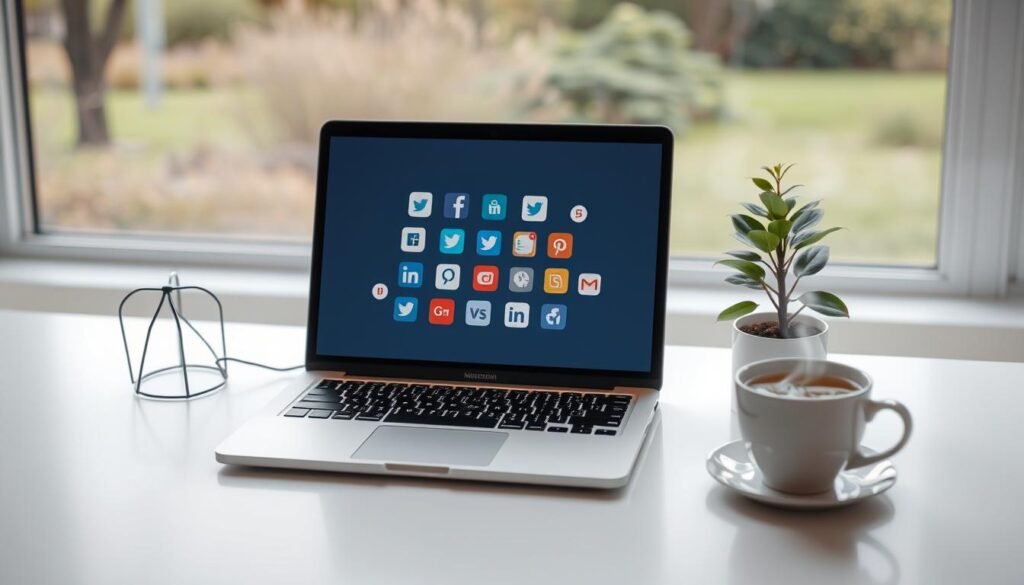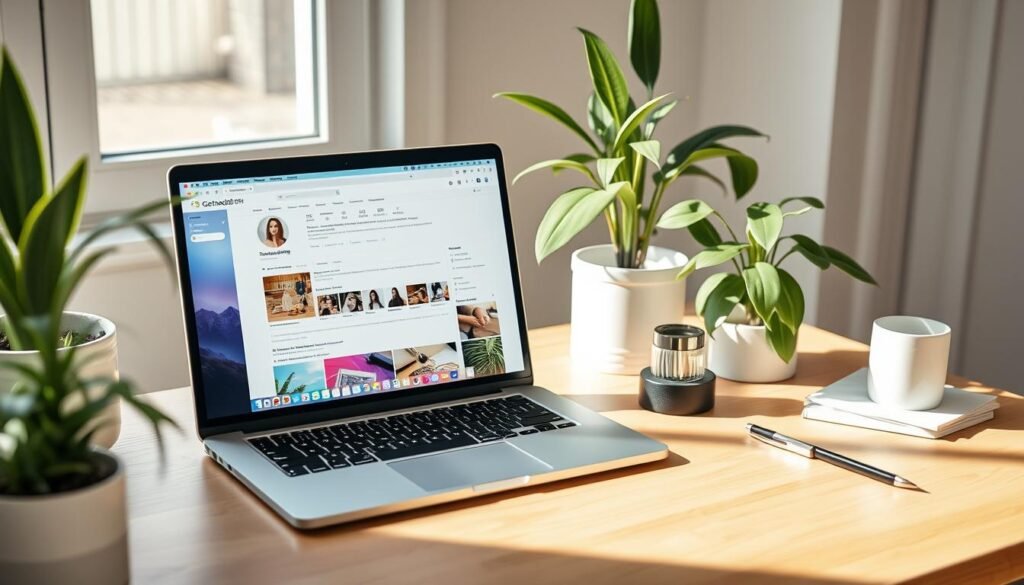Did you know that regular social media users are much more likely to feel anxious or depressed? This is 2.7 times more likely than for people who don’t use social media as much. This fact shows a big concern in the online world today. Social media and anxiety are closely linked and affect people of all ages. Anxiety from social media can come from many things. This includes the need to show a perfect life online and the fear of missing out.
To handle anxiety from social media, understanding its pressures is important. The need to compare ourselves to others and to get likes and comments can be overwhelming. So, it’s vital to create a healthy balance with social media. This article gives important tips and advice for dealing with social media anxiety. You can find ways to better manage your time online and keep your mind healthy. For more help, check out this link.
Key Takeaways
- Understanding social media anxiety is essential for maintaining mental health.
- Genuine interactions in the real world can help alleviate feelings of isolation.
- Setting time limits can significantly reduce anxiety levels associated with social media use.
- Being aware of triggers, such as negative comparisons, can help in managing responses.
- Curation of the online feed is vital to prevent exposure to negative influences.
- Seeking professional help is advisable if social media use greatly impacts mental well-being.
Understanding Social Media Anxiety
Social media anxiety is all about feeling stressed out online. Many people work hard to look perfect on the web. This effort to seem flawless can really make us anxious, especially young folks.
What is Social Media Anxiety?
Social media anxiety shows up as a deep worry about being judged. About 48 percent of teens on screens five hours a day face serious risks. Those who spend less time, only two hours, have less risk. The anxiety can come from the pressure to post cool stuff. Or from the fear of not getting enough likes. It’s important to dive into this to help with mental health.
The Impact of Online Personas on Mental Health
Who we are online can be very different from who we are in real life. This gap can mess with our mental health. Kids using their phones a lot might feel swamped by all the chatting. It ups their social anxiety. Parents can really help their teens by limiting screen time. And by teaching them about the online world in a smart way.
Recognizing Triggers of Social Media Anxiety
Knowing what causes social media anxiety helps us handle it better. Studies show many factors affect our digital stress levels. The push to get likes and comments can make us feel not good enough.
FOMO, or fear of missing out, makes it worse. It happens when we see others having fun online and feel left out. Comparing ourselves to others online also raises anxiety. These issues are crucial in affecting our mental well-being. Learning to deal with them is key to tackling social media anxiety.
Key Factors Contributing to Anxiety
Several things cause anxiety from social media. Look at these:
- The craving for validation through likes and comments can make us overly dependent.
- Fear of missing out shows up when we see others’ fun events online. This makes us compare more.
- Time spent on social media can lead us to ignore real life. We lose touch with people offline.
- Notification overload from constant alerts adds to stress. It makes it hard to focus on daily tasks.
Using mindfulness can help cut down anxiety from social media. Try to use your screen less and pick who you interact with wisely. You can find more help by looking at information on social media’s effects.
The Role of Comparison and FOMO
Comparing ourselves on social media is common. Users often only share their best moments. This makes reality seem different and can make us feel bad. FOMO leads to putting too much emotion into social media. Feeling like we can’t match up to others’ perfect online lives is common.
Recognizing these triggers is important. It helps us lessen their impact, reduce anxiety, and improve our mental health. There is more evidence linking social media use to mental health issues. Finding ways to manage these feelings is getting more important.

Social Media and Anxiety: The Psychological Effects
To understand social media’s psychological effects, we need to study how it’s linked to anxiety. It’s crucial to know the difference between correlation and causation. While higher anxiety levels are reported in social media users, it’s not clear if social media use leads to anxiety or if those already anxious are more active online.
Correlation vs. Causation
A study at Iowa State University found an interesting link between social media and mental health. It showed that students who limited their social media to 30 minutes a day felt less anxious and depressed. This suggests managing social media time can improve one’s mood, raising feelings of excitement and pride.
Research Findings on Social Media’s Impact on Well-being
Many studies have looked into how social media affects mental health. Some people get stressed by constant comparison or FOMO (fear of missing out). However, social media can also be a comfort, offering support and understanding through online communities. A review showed social media lets people share experiences and ways to cope. But, checking profiles too often can stress people out and make them feel depressed.
Reducing social media use has been shown to help. The study mentioned earlier saw participants noting they were more productive and slept better after cutting down on social media. These results show the good that can come from using social media wisely. Being mindful of how we use social media can lead to better emotional health. Being thoughtful about our social media is key to finding emotional balance.
| Study | Key Findings |
|---|---|
| Iowa State University | Reduced social media to 30 minutes daily improved anxiety and depression scores. |
| Berryman et al. | No predictive link found between social media use and impaired mental health among young adults. |
| Coyne et al. | Increased social media time not linked to rising mental health issues over 8 years. |
| Keles et al. | Time spent on social media correlates with depression, anxiety, and psychological distress. |
| Nereim et al. | Passive social media use more closely associated with depression than active engagement. |
Mindful Social Media Usage
Being mindful of how we use social media is key to staying mentally healthy. We can manage anxiety better by using strategies. This helps us control how we interact online. Recognizing our habits is also important. It helps us see when we’re spending too much time online. This way, we can enjoy our digital life more.
Strategies for Being Present Online
Setting boundaries is crucial for a balanced online life. Here are some tips to help:
- Check your social media only at specific times to avoid endless browsing.
- Use a timer to limit how long you’re online each day. This makes us more mindful.
- Switch off unnecessary notifications to reduce distractions and stress.
- Be real and connect with positive people and groups online.
- Take breaks from social media, like a day or weekend, to refresh your habits.
Identifying Personal Cues for Excessive Use
Knowing yourself is vital for mindful social media use. Notice what makes you overuse it. Reducing anxiety starts with that. Here are signs you might be using it too much:
- Feeling bored or lonely can make you scroll more.
- Getting upset by online comparisons or fearing you’re missing out.
- Realizing social media often makes you feel worse, not better.
- Tracking your social media time and mood can show your habits.
- Writing about your social media feelings helps understand your triggers and feelings.

Using these methods, we can create a healthier online relationship. These anxiety-reducing strategies help us interact more meaningfully. They keep us mindful of our emotional well-being, making social media a positive part of our daily lives.
Taking Control of Your Feed
Taking control of a social media feed is vital for mental well-being. It helps in reducing anxiety. By choosing what to see, we make a space that boosts positivity and support. This method comes from understanding social media’s effect on our mental state. Some content can make us feel less and increase anxiety.
Curating Your Digital Environment
Building a positive digital space means picking content that matches what you value and like. It’s good to stick with accounts that make you feel good. Here’s what you can do:
- Identify and follow accounts that uplift and inspire.
- Regularly reassess the accounts being followed to ensure they remain beneficial.
- Engage with content that encourages healthy discussions and connections.

Unfollowing and Muting Negative Influences
Letting go of negative influences can change the impact of social media on us. If some accounts make you feel anxious or unlike yourself, it’s okay to mute or unfollow them. This change can lead to a better online experience. Signs that it’s time to make a change include:
- Feeling anxious, sad, or irritated after going through your feed.
- Constantly comparing oneself to others.
- Checking social media too often.
- Frequent FOMO (fear of missing out).
Handling your social media this way decreases bad feelings. It also promotes healthier online activities. By creating a supportive online community and avoiding upsetting content, you can enjoy social media more. This improves your overall mental health.
| Strategy | Description |
|---|---|
| Curate Content | Follow positive and uplifting accounts to improve mood. |
| Unfollow Negative Influences | Remove accounts that trigger anxiety or feelings of inadequacy. |
| Limit Engagement | Set specific times for social media use to prevent overload. |
| Take Breaks | Frequent short breaks can help recharge and reduce social media’s impact. |
The Importance of Real-World Interactions
The growing reliance on social media can create a paradox. Virtual interactions could replace meaningful real-world experiences. Face-to-face connections build a sense of belonging and community that often fades online. Grasping the value of real-life interactions aids in lessening social media anxiety.
How Face-to-Face Connections Alleviate Anxiety
Research shows a big gap between online and in-person social engagement. Online chats may feel comforting briefly, but in-person connections bring deeper emotional bonds. Real-life supportive relationships help fight off loneliness and anxiety.
- Enhances Emotional Support: Personal interactions build intimate support networks.
- Promotes Authentic Engagement: Talking face-to-face forges genuine connections.
- Reduces Feelings of Isolation: This socialization combats loneliness well.
Studies reveal regular social media use is linked to better social well-being. However, too much online interaction, driven by fear of missing out, can lead to anxiety and distress. Research with 2,348 college students showed social anxiety was higher in real-life than online. This has big implications for mental health.
| Factor | Effect on Social Anxiety |
|---|---|
| Real-World Interaction | Higher levels of anxiety |
| Online Interaction | Lower levels of anxiety |
| Excessive Social Media Use | Negative impact on self-rated health |
| Face-to-Face Connections | Supports mental well-being |
Highlighting the importance of real-world contact improves emotional health. By focusing on face-to-face links, people can lower social media anxiety. They build a more balanced social existence.
Practicing Self-Compassion and Validation
In today’s world, social media often shows perfect life snapshots. Knowing how to be kind to oneself is very important. People struggle with their self-worth versus their online image. The chase for likes and comments can make us rely too much on social media’s shallow praise. This situation makes feeling good about ourselves harder and can make us more anxious.
Differentiating Self-Worth from Online Presence
Seeing the difference between self-worth and online validation is key for mental health. Social media can make us compare too much, making us feel not good enough. If we think self-worth equals online reactions, we end up in a harmful cycle. We feel lower than our achievements. Knowing our value comes from inside, not online numbers, can help us escape social media’s negative effects.
Strategies for Reinforcing Self-Compassion
Using good methods for self-validation helps grow self-kindness. These methods can include:
- Writing about personal wins to remember our strengths, not others’ lives.
- Doing joyful things without thinking about online likes.
- Being mindful to focus on now and care less about online approval.
- Setting limits on social media use to feel better about ourselves.
- Creating offline support groups for real-life encouragement and to confirm our worth.
By using these strategies for self-validation, we can feel better about ourselves. This helps us be mentally stronger and less anxious about online life.
Seeking Professional Help for Social Media Anxiety
The role of social media in affecting our mental health is becoming clearer. Some people might need extra support. It’s crucial to know when to seek professional help for managing social media anxiety. If you often feel not good enough or extremely anxious because of online interactions, it’s time to consider a mental health consultation.
When to Consult a Mental Health Professional
Look out for signs that suggest a need for a mental health expert:
- Persistent anxiety or stress related to social media use.
- Feeling alone or avoiding real-life social situations.
- Comparing yourself to others online, which lowers self-esteem.
- Dealing with more cyberbullying or online harassment.
Types of Therapies that Address Social Media Anxiety
There are various effective therapies for those dealing with social media issues. Below are some popular methods:
| Type of Therapy | Description |
|---|---|
| Cognitive Behavioral Therapy (CBT) | Helps change negative thinking and behaviors around social media. |
| Mindfulness-Based Therapy | Uses mindfulness to stay present and lessen anxiety on social media. |
| Acceptance and Commitment Therapy (ACT) | Helps accept feelings about social media and act according to values. |
| Online Therapy | Offers easy access to therapy through online sessions in many states. |
Conclusion
Social media anxiety requires handling it from different angles. This includes mindfulness and managing online spaces well. Sometimes, help from friends or professionals is needed too. Studies show that too much social media can affect those with mental illnesses badly. Reducing time on Facebook, Snapchat, and Instagram can help lessen depression and loneliness, as Melissa G. Hunt’s research suggests.
Knowing the effects of social comparisons is key. They often make us feel not good enough and anxious. By choosing what appears in our feeds carefully and reducing negative content, we can fight anxiety better. Having real-life friendships can make our online lives healthier and happier.
In the end, there are steps to lessen the bad impact of social media on us. Being mindful about how we use social media, and seeking help when needed, can improve our experience online. For more on how social media affects our mental health, check this important study.